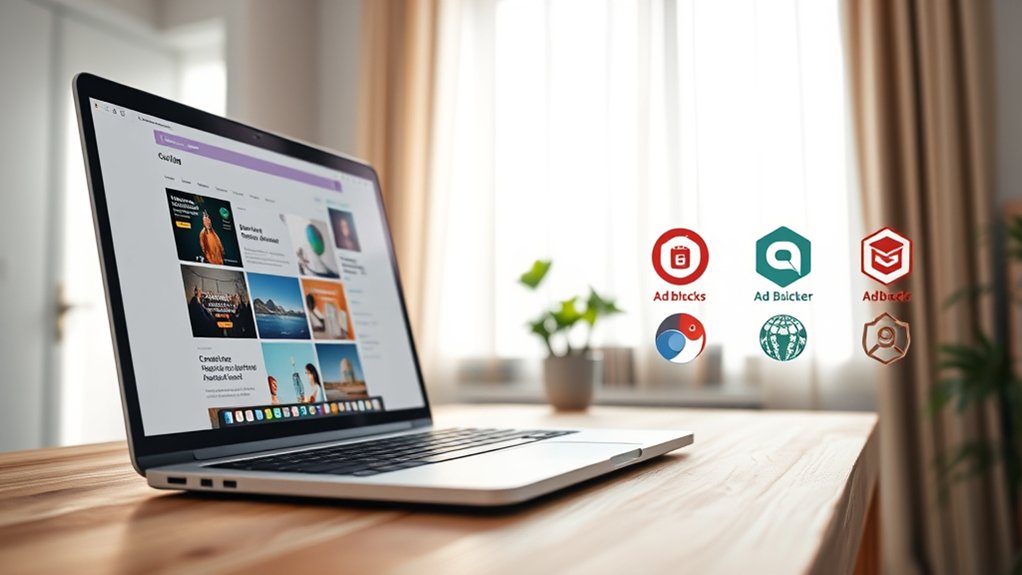Ad blockers markedly improve online experiences by filtering intrusive advertisements and protecting user privacy. Popular tools like Surfshark CleanWeb and Total Adblock support smoother web browsing, whereas NordVPN Threat Protection combines ad blocking with anti-malware features. Studies indicate that these applications boost page loading times and user satisfaction. Importantly, ad blockers operate on predefined rules that continuously update to maintain effectiveness. For a deeper understanding of their mechanisms and industry implications, further exploration is encouraged.

In an increasingly digital world, ad blockers have emerged as essential tools for improving the online experience. These applications primarily serve to raise user satisfaction by eliminating intrusive advertisements that often disrupt seamless browsing. According to various studies, users report a more pleasant experience as ad blockers reduce visual clutter, allowing for more focused engagement with content. Moreover, the use of ad blockers has been shown to enhance video streaming experiences by ensuring smoother playback without interruptions.
Furthermore, ad blockers greatly improve privacy; they block third-party trackers, thereby diminishing data collection by advertisers. Performance improvements likewise characterize the use of ad blockers. Research indicates that blocking heavy ad content can lead to faster web page loading times, which translates to better overall performance. Studies suggest that ad blockers could positively impact companies by allowing them to focus on quality content, indicating a complex ecosystem where user experience and advertising strategies can align.
Leading ad blocker tools such as Surfshark CleanWeb and Total Adblock provide not only filtering capabilities but also integrate advanced security features. For instance, NordVPN Threat Protection offers both ad blocking and anti-malware features, ensuring users remain safe during browsing. Ad Block, one of the oldest and most recognized options, is compatible with various browsers, making it a reliable choice for a wide audience.
Moreover, the working mechanisms of ad blockers rely on identifying and blocking ad components based on predefined rules. They scan web pages for unwanted content, and through whitelisting, users can selectively allow ads on trusted sites, preserving the financial models of favored content providers.
Nonetheless, although these tools benefit users, they also challenge website operability, particularly for platforms that rely heavily on advertising for revenue. This has led to certain websites investigating alternative revenue strategies, including ad-free subscription models.
Ultimately, with the rise of ad blockers, there exists a complex interplay between user preferences and publisher revenue. These tools not only improve the online experience for individuals but also compel the advertising industry to reconsider approaches, potentially leading to an ecosystem that values quality content over intrusive ads.
As the digital environment evolves, the implications of ad blockers will continue to shape online interactions.
Frequently Asked Questions
Are Ad Blockers Legal to Use?
Ad blockers are typically considered legal for personal use, as they allow users to filter online content. Various courts have upheld this right, affirming the legality of ad-blocking technologies.
Nevertheless, the legality may be contested when bypassing copyright access controls, which can lead to complications. In Europe, legal support for ad blockers persists, emphasizing respect for access policies.
As of 2021, approximately 27% of U.S. internet users employed ad blockers to improve their browsing experience.
Do Ad Blockers Slow Down My Internet Speed?
Ad blockers do not inherently slow down internet speed; rather, they can boost web browsing performance. By preventing ads and related scripts from loading, these tools reduce CPU and memory usage, together with page loading times.
According to studies, users on slower connections experience a more noticeable improvement in speed, with significant bandwidth savings reported.
Nevertheless, the impact remains limited to browsing speed and does not affect overall internet connection performance for other applications.
Can Ad Blockers Be Disabled on Specific Sites?
Ad blockers can certainly be disabled on specific sites, allowing users to customize their online experience.
Popular ad blockers like uBlock Origin and AdBlock offer features such as allowlisting, enabling users to permit ads on chosen domains. This customization supports content creators who rely on ad revenue.
Nevertheless, caution is advised, as disabling ad blockers may expose users to security risks and increase unwanted ad visibility, impacting overall browsing experience.
Will Ad Blockers Protect My Privacy From Trackers?
Ad blockers remarkably improve user privacy by preventing trackers from collecting personal data.
Research indicates that approximately 87.55% of users express concern over online data tracking.
Tools like Privacy Badger and uBlock Origin excel at blocking unwanted tracking scripts as well as encouraging better privacy practices among advertisers.
Importantly, reputable ad blockers furthermore offer whitelisting options, allowing users to support websites with non-intrusive advertising.
This functionality promotes a balance between user privacy and content accessibility.
How Do I Know if My Ad Blocker Is Working?
To assess ad blocker efficacy, users can monitor website loading speed and observe a cleaner interface free from disruptive advertisements.
Studies demonstrate that effective ad blockers can decrease page load times by 30% or more. Furthermore, analytics provided by some ad blockers may indicate the number of ads blocked, along with potential bandwidth savings.
Regular updates of filter lists further guarantee that the ad blocker adapts to new advertising techniques and maintains peak performance.









